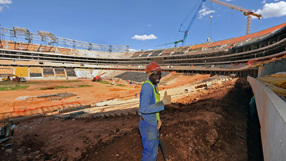Cost of 2010 stadiums hit by weak rand
JOHANNESBURG - South Africa will finish building all 10 stadiums for the 2010 World Cup on time although the cost will be higher than forecast due in part to a weaker rand, a senior official said on Wednesday.

"All of the stadiums will be complete and there is no doubt about that," Danny Jordaan, chief executive of the 2010 local organising committee, told a news conference.
"Some of the (construction) materials will be procured outside the country. As the rand weakens, there will be some cost overruns," he said, noting that the price of oil added another layer of unpredictability to the process.
Rising prices for imported cement, steel and other key building materials and higher labour costs have wreaked havoc on the stadium construction budget, leading to a 3.2 billion rand ($314 million) shortfall.
Local organisers are concerned about keeping the budget from spiralling out of control and finding the funds to meet the shortfall, which the South African government has already pledged 1.4 billion rand towards.
The weaker rand has complicated the budget projections.
In the past year the currency has lost about 30 percent of its value against the U.S. dollar and 24 percent versus the euro. The eurozone is South Africa's main trading partner.
Jordaan also poured scorn on the idea that soccer's world governing body FIFA could move the tournament, which is the first World Cup hosted in Africa, to an alternate location if South Africa stumbled in its preparations.
Get FourFourTwo Newsletter
The best features, fun and footballing quizzes, straight to your inbox every week.
The prospect that Brazil, Australia or Germany could stand in to host the finals at the last minute gained ground in 2007 when stadium construction in the nine host cities was plagued by delays, labour unrest and court challenges.
Journalists dubbed the idea 'Plan B', infuriating South African officials. "Plan B is dead," Jordaan said.
South Africa expects 480,000 visitors for the World Cup, which starts on June 11, 2010, and hopes the month-long finals will spur tourism and investment in Africa's richest economy.
